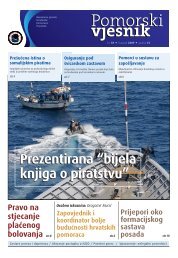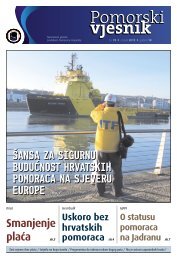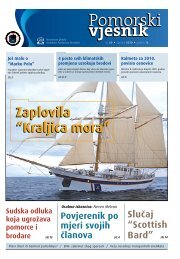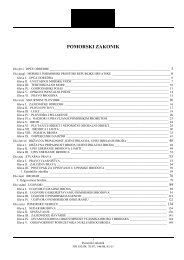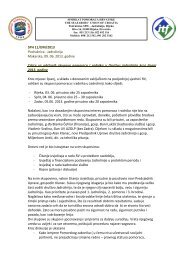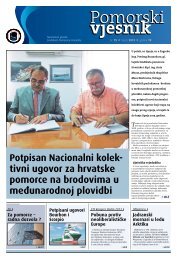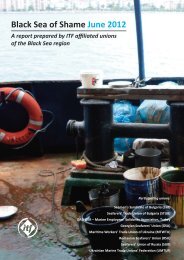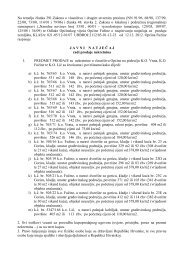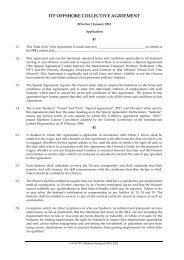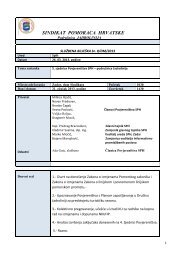Konvencija o radu pomoraca, 2006 (engleski i hrvatski jezik)
Konvencija o radu pomoraca, 2006 (engleski i hrvatski jezik)
Konvencija o radu pomoraca, 2006 (engleski i hrvatski jezik)
You also want an ePaper? Increase the reach of your titles
YUMPU automatically turns print PDFs into web optimized ePapers that Google loves.
6. Hotels or hostels suitable for seafarers should be available where there is need for them. They should<br />
provide facilities equal to those found in a good-class hotel, and should wherever possible be located<br />
in good surroundings away from the immediate vicinity of the docks. Such hotels or hostels should<br />
be properly supervised, the prices charged should be reasonable in amount and, where necessary and<br />
possible, provision should be made for accommodating seafarers’ families.<br />
7. These accommodation facilities should be open to all seafarers, irrespective of nationality, race,<br />
colour, sex, religion, political opinion or social origin and irrespective of the flag State of the ship on<br />
which they are employed or engaged or work. Without in any way infringing this principle, it may be<br />
necessary in certain ports to provide several types of facilities, comparable in standard but adapted to<br />
the customs and needs of different groups of seafarers.<br />
8. Measures should be taken to ensure that, as necessary, technically competent persons are employed full<br />
time in the operation of seafarers’ welfare facilities and services, in addition to any voluntary workers.<br />
Guideline B4.4.3 - Welfare boards<br />
1. Welfare boards should be established, at the port, regional and national levels, as appropriate. Their<br />
functions should include:<br />
(a) keeping under review the adequacy of existing welfare facilities and monitoring the need for the<br />
provision of additional facilities or the withdrawal of underutilized facilities; and<br />
(b) assisting and advising those responsible for providing welfare facilities and ensuring coordination<br />
between them.<br />
2. Welfare boards should include among their members representatives of shipowners’ and seafarers’<br />
organizations, the competent authorities and, where appropriate, voluntary organizations and social bodies.<br />
3. As appropriate, consuls of maritime States and local representatives of foreign welfare organizations<br />
should, in accordance with national laws and regulations, be associated with the work of port, regional<br />
and national welfare boards.<br />
Guideline B4.4.4 - Financing of welfare facilities<br />
1. In accordance with national conditions and practice, financial support for port welfare facilities should<br />
be made available through one or more of the following:<br />
(a) grants from public funds;<br />
(b) levies or other special dues from shipping sources;<br />
(c) voluntary contributions from shipowners, seafarers, or their organizations; and<br />
(d) voluntary contributions from other sources.<br />
2. Where welfare taxes, levies and special dues are imposed, they should be used only for the purposes<br />
for which they are raised.<br />
Guideline B4.4.5 - Dissemination of information and facilitation measures<br />
1. Information should be disseminated among seafarers concerning facilities open to the general public<br />
in ports of call, particularly transport, welfare, entertainment and educational facilities and places of<br />
worship, as well as facilities provided specifically for seafarers.<br />
183



